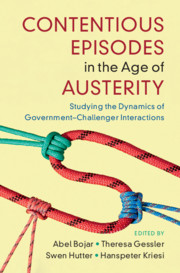 Contentious Episodes in the Age of Austerity
Contentious Episodes in the Age of Austerity from Part III - Dynamics of Interaction
Published online by Cambridge University Press: 05 November 2021
In the previous chapter, we have looked at the interactions between the three types of protagonists, independently of the context in which they interact. In the present chapter, we shall take context characteristics into account in order to identify the extent to which interaction dynamics are context-specific. In doing so, we shall focus on governments and analyze how their reactions to challenger and third-party actions depend on the context. The next chapter will change the perspective and analyze challengers’ reactions to government and third-party actions. In focusing on the governments’ reactions, we shall build on the analysis of the previous chapter. Concerning the governments’ reactions to challengers, the results found in the previous chapter were quite inconclusive. By and large, government behavior appeared to be independent of previous challenger actions, although the results to some extent supported the threat hypothesis with respect to repression. As far as the impact of third parties is concerned, we found some support for the isolation hypothesis: Governments had a higher propensity to repress challengers when they were not supported by third parties. The most important result, however, was the effectiveness of third-party mediation: Governments tended to honor mediation attempts with concessions. In the present chapter, we shall put these somewhat inconclusive results into perspective by taking into account the context-dependence of the governments’ reactions. In terms of mechanisms, we introduced environmental mechanisms that condition the relational mechanisms that we studied in a “context-blind” approach in the previous chapter.
To save this book to your Kindle, first ensure [email protected] is added to your Approved Personal Document E-mail List under your Personal Document Settings on the Manage Your Content and Devices page of your Amazon account. Then enter the ‘name’ part of your Kindle email address below. Find out more about saving to your Kindle.
Note you can select to save to either the @free.kindle.com or @kindle.com variations. ‘@free.kindle.com’ emails are free but can only be saved to your device when it is connected to wi-fi. ‘@kindle.com’ emails can be delivered even when you are not connected to wi-fi, but note that service fees apply.
Find out more about the Kindle Personal Document Service.
To save content items to your account, please confirm that you agree to abide by our usage policies. If this is the first time you use this feature, you will be asked to authorise Cambridge Core to connect with your account. Find out more about saving content to Dropbox.
To save content items to your account, please confirm that you agree to abide by our usage policies. If this is the first time you use this feature, you will be asked to authorise Cambridge Core to connect with your account. Find out more about saving content to Google Drive.